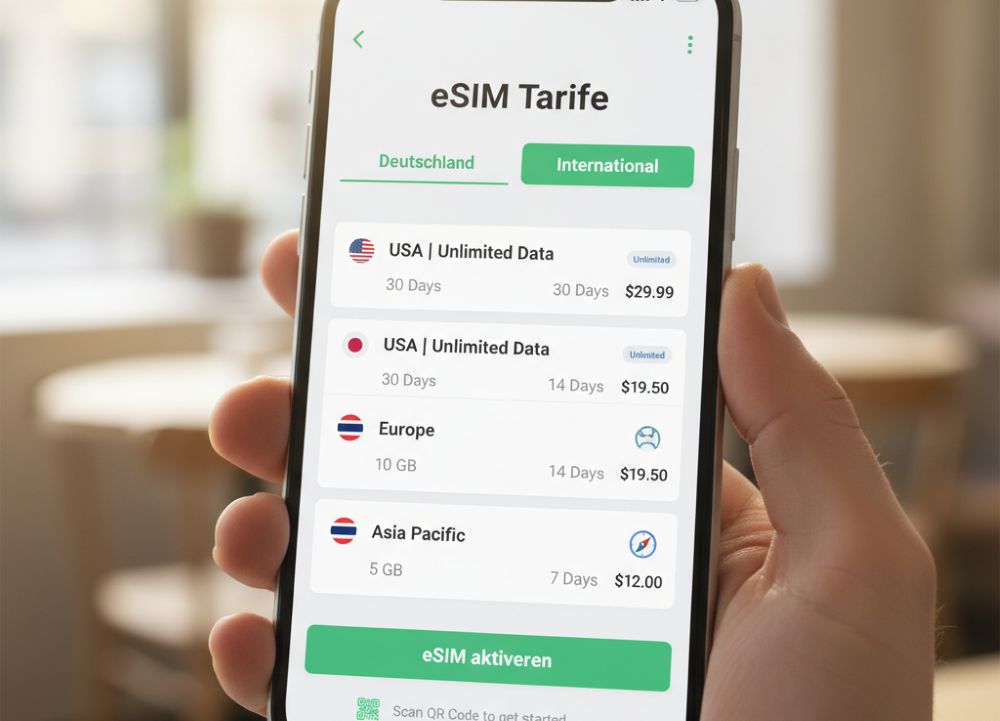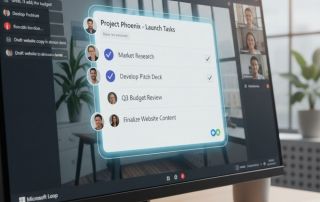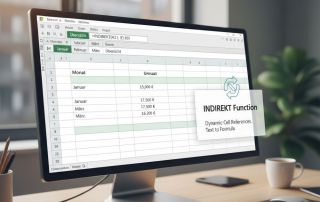The eSIM revolution: What it is, how it works, and who offers the best tariffs.
The small plastic card we’ve been inserting into our cell phones for decades will soon be obsolete. The future is eSIM – a technology that is not only more flexible and convenient, but also more secure. But what exactly is an embedded SIM, how do you activate it, and which providers in Germany will be leading the way in 2025?
This article explains everything you need to know about the digital SIM card.

What is an eSIM and how does it work?
The “e” in eSIM stands for “embedded.” Unlike a traditional SIM card, the eSIM is no longer a physical card that needs to be inserted or swapped. Instead, it’s a chip permanently soldered into the device.
How to activate it:
Think of the eSIM as a small, empty container inside your smartphone, smartwatch, or tablet. To use this container, you need to download a digital “eSIM profile.” This profile contains all the information your device needs to connect to your provider’s mobile network (just like the data on a traditional plastic SIM card).
How to activate it:
Think of the eSIM as a small, empty container inside your smartphone, smartwatch, or tablet. The process is incredibly simple and usually only takes a few minutes:
- Book a plan: You order an eSIM-enabled plan from a mobile provider (online or in a store).
- Receive a QR code: Instead of a plastic card, the provider sends you an activation letter or an email with a QR code.
- Add the eSIM: You go to your smartphone’s mobile network settings (e.g., under “Mobile” > “Add eSIM” or “Add mobile plan”).
- Scan the code: You scan the QR code with your phone’s camera.
- Download the profile: Your device connects to the internet (usually via Wi-Fi) and securely downloads the eSIM profile.
- Activate: You confirm the activation, and your new plan is ready to use within moments.
The biggest advantage: This chip can hold multiple SIM cards. eSIM profiles can be stored simultaneously (e.g., your personal plan, a business plan, and a data plan for vacation). Depending on the device, you can then actively use one or even two plans at the same time (dual SIM).
The pros and cons of eSIM
The technology offers enormous advantages, but also has a few disadvantages that you should be aware of.
Advantages (Pros)
- Immediate availability: No more waiting for the mail. A new plan can often be activated within 5-10 minutes of booking.
- High flexibility: Switching providers is quick and easy.
- Perfect for dual SIM: You can use your phone (even if it only has one physical SIM slot) as a dual SIM device (e.g., 1 physical SIM + 1 eSIM). Newer devices like the iPhone 14/15 (in the US) no longer have a physical SIM card slot and rely entirely on dual eSIM.
- Ideal for travel: You can keep your German SIM active and simply add an inexpensive local data eSIM (e.g., for the US or Asia) for your vacation. No more annoying searches for a SIM card shop at the airport.
- Security: In case of theft, the SIM card cannot simply be removed to take the phone offline. This increases the chance of locating the device.
- Space-saving: The elimination of the SIM card slot saves valuable space inside the device, which manufacturers can use for larger batteries or other technologies.
Disadvantages (Cons)
- Inconvenient device switching: The biggest disadvantage. You can’t simply take the SIM card out of your old phone and put it in your new one. Transferring an eSIM profile requires a digital transfer process. While this is becoming easier (e.g., via special transfer tools from Apple or Samsung), it’s often still more cumbersome than a physical SIM card swap.
- Device compatibility: eSIM isn’t yet supported by all devices, although it’s standard on almost all new flagship smartphones (Apple from iPhone XS/XR onwards, Samsung from the S20 onwards, Google from the Pixel 3 onwards). Cheaper or older models often lack this feature.
- Carrier compatibility: While all major carriers support eSIM, some smaller budget providers are still hesitant to offer the technology.
Comparison: The best eSIM providers 2025/2026
When choosing the “best” provider, we must distinguish between two categories:
- German mobile network operators: For your main contract (calls, SMS, data) in Germany.
- International travel providers: For data-only plans abroad (or for tourists in Germany).
Category 1: Best eSIM providers for Germany (main contracts)
This is where the market has become established. Almost all major providers in Germany offer their standard plans (contract and often also prepaid) as eSIMs.
| Provider | network | eSIM available for… | Notes |
|---|---|---|---|
| Deutsche Telekom | Telekom (D1 | Contract and prepaid | Offers the best network coverage and quality in Germany, but at premium prices. eSIM activation is very easy via the customer portal. |
| Vodafone | Vodafone (D2) | Contract and prepaid | Excellent network, priced similarly to Telekom. Also offers a straightforward eSIM process for new and existing customers. |
| O2 (Telefónica) | O2 | Contract and prepaid | It often offers the best value for money and very large data packages. The network is excellent in cities, but sometimes weaker than D1/D2 in rural areas. |
| Congstar | Telekom (D1) | Contract only | Telekom’s second brand. Offers cheaper tariffs on the best D1 network and fully supports eSIM, even for prepaid customers. |
| 1&1 | Vodafone / Telefónica | Contract and prepaid | Uses the Vodafone or O2 networks (depending on the plan). Offers eSIM for all its contract plans. |
| Others (e.g. SIMon, Freenet, etc.) | Various | Mostly contract | Many other discount providers and brands (such as SIMon mobile, Freenet, otelo) also offer eSIM. Support for prepaid plans varies considerably. |
For a primary contract in Germany, Telekom, Vodafone, and O2, as well as their secondary brands (such as Congstar), are the most reliable options for eSIM. The choice depends primarily on your requirements for network quality and data volume.
Category 2: Best eSIM Providers for Travel (International Data)
This category is dominated by global specialist providers that sell data-only plans for almost every country in the world. Activation is done via app and QR code, often without identity verification, as these are data-only plans.
| Provider | Specializing in… | Price level | Notes |
|---|---|---|---|
| Airalo | Worldwide coverage | Low to mid-range | One of the best-known and most reliable providers. Offers packages for individual countries, regions (e.g., Europe, Asia), or globally. The app is very user-friendly. |
| Holafly | Unlimited data packages | Medium to High | The best choice if you need unlimited data in a country (e.g., the USA, Japan, or Turkey). Often a bit more expensive, but worry-free. |
| Saily | Worldwide coverage | Cheap | A newer provider from the creators of NordVPN. It stands out due to its very aggressive and low prices and is rapidly expanding its country coverage. |
| Nomad | Flexible packages | Cheap | Offers very flexible and often very affordable entry-level packages (e.g., 1 GB for 7 days). Good for shorter trips or low data needs. |
For holidays abroad, specialist providers (such as Airalo for flexibility or Holafly for unlimited data) are almost always cheaper and more practical than roaming options from your German provider.
Here’s how to check if your mobile phone is eSIM-compatible.
The quickest way to find this out is directly in your device’s settings:
Apple iPhone:
- Go to “Settings” > “Cellular”.
- Look for the “Add eSIM” or “Add Cellular Plan” option.
- (All models since iPhone XS/XR/SE 2nd Gen. are compatible).
Samsung Galaxy:
- Go to “Settings” > “Connections” > “SIM Management”.
- Look for the “Add eSIM” option.
- (All flagship phones since the S20 series are compatible).
Google Pixel:
- Go to “Settings” > “Network & Internet”.
- Tap the “+” icon next to “Mobile Network”.
- Look for “Download SIM instead?”
- (All models since Pixel 3 are compatible).
Conclusion
The eSIM is no longer a thing of the future, but the established standard for modern devices. It offers unbeatable flexibility – whether for using two numbers on one mobile phone or for easy internet access while on vacation.
While switching to a new device is still a bit more complicated than with the old plastic SIM card, the advantages in everyday use clearly outweigh the inconvenience.
Beliebte Beiträge
Warum dein Excel-Kurs Zeitverschwendung ist – was du wirklich lernen solltest!
Hand aufs Herz: Wann hast du zuletzt eine komplexe Excel-Formel ohne Googeln getippt? Eben. KI schreibt heute den Code für dich. Erfahre, warum klassische Excel-Trainings veraltet sind und welche 3 modernen Skills deinen Marktwert im Büro jetzt massiv steigern.
Microsoft Loop in Teams: The revolution of your notes?
What exactly are these Loop components in Microsoft Teams? We'll show you how these "living mini-documents" can accelerate your teamwork. From dynamic agendas to shared, real-time checklists – discover practical use cases for your everyday work.
Career booster 2026: These Microsoft Office skills will take you further!
A new year, new career opportunities! But which Office skills will really be in demand in 2026? "Skilled use" is no longer enough. We'll show you today's must-haves – like advanced Excel, using AI in the office, and relevant certifications for your resume.
Excel Tutorial: How to quickly and safely remove duplicates
Duplicate entries in your Excel lists? This distorts your data. Our tutorial shows you, using a practical example, how to clean up your data in seconds with the "Remove Duplicates" function – whether you want to delete identical rows or just values in a column.
Dynamic ranges in Excel: OFFSET function
The OFFSET function in Excel creates a flexible reference. Instead of fixing =SUM(B5:B7), the function finds the range itself, e.g., for the "last 3 months". Ideal for dynamic charts or dashboards that grow automatically.
Mastering the INDIRECT function in Excel
The INDIRECT function in Excel converts text into a real reference. Instead of manually typing =January!E10, use =INDIRECT(A2 & "!E10"), where A2 contains 'January'. This allows you to easily create dynamic summaries for multiple worksheets.

































